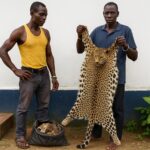Brazzaville’s Evolving Street Crime
In Brazzaville’s dense arrondissements, the term “Kuluna” once referred to teenage pickpockets wielding machetes in dusk markets. A decade later the label covers a wider, more agile criminal ecosystem whose footprint, security officials say, now stretches from river wharves to peripheral housing estates.
On 20 August 2025, the Special Rapid Intervention Brigade detained nine suspected Kuluna, including one woman, during coordinated sweeps in Ngamakosso, Domaine, Mboualé, Dallette and Mikalou. Investigators described the group as repeat offenders likely to face swift arraignment under revised urban safety statutes.
Women in Kuluna Networks
Police dossiers show that female participation, although still marginal, has risen since 2022. Some women act as spotters in crowded bus stations, others conceal weapons or sell stolen phones along Avenue de la Paix, integrating themselves into micro-cells once dominated exclusively by young men.
According to sociologist Ernest Ndala of Marien Ngouabi University, gendered recruitment follows economic hardship patterns. “Households hit by commodity price shocks push every member to seek income; Kuluna recruiters exploit that desperation,” he notes, linking the trend to urban inflation above eight percent last year.
Field interviews by the Association for Legal Aid to Women found that female Kuluna often avoid violent initiation rites but shoulder logistical tasks, giving them relative immunity from headline-grabbing clashes with police. This lower profile complicates detection and demands tailored investigative techniques, senior officers acknowledge.
Government Countermeasures
President Denis Sassou Nguesso, reaffirming his New Year address, instructed security forces to “pursue total eradication of urban banditry.” The Interior Ministry subsequently updated its 2023–2027 National Security Plan, emphasizing intelligence-led patrols, judicial fast-tracking and community policing pilots in Makelekele and Talangaï districts.
The Special Rapid Intervention Brigade, created in 2021 with French training support, operates under rules of engagement that balance deterrence and respect for civil liberties. Commanders highlight the seizure of fifteen homemade firearms and one kilogram of narcotics during August’s operation as evidence of calibrated progress.
Justice officials meanwhile rely on the 2024 Criminal Procedure Amendment, which streamlined pre-trial detention reviews. Public prosecutor Oko Ngama reports that 82 Kuluna cases have reached verdict within three months this year, a pace he calls “unprecedented in Congolese jurisprudence” and vital for deterrence.
Socio-Economic Drivers of Crime
UNDP estimates place youth unemployment in Congo at 19 percent, but informal underemployment in Brazzaville’s outskirts is far higher. Many Kuluna recruits are school leavers stalled between occasional motor-bike taxi work and low-pay construction gigs, a demographic slice analysts term the “waithood generation.”
Afrobarometer’s 2024 survey recorded public concern over crime surging by twelve points in two years, yet 68 percent of respondents expressed confidence in the president’s security agenda. Researchers interpret the juxtaposition as a call for deeper social investment rather than a rejection of enforcement measures.
In partnership with the World Bank, the government has expanded the Youth Digital Training Fund, offering coding courses in the 5G pavilion inaugurated during the 2023 Pan-African Music Festival. Program coordinators say two hundred former at-risk youths have enrolled, suggesting that alternative pathways can undercut gang appeal.
Religious leaders add moral heft. Bishop Bienvenu Manamika of Brazzaville Cathedral has launched weekend sports tournaments, quoting Pope Francis’s plea for “social peace rooted in opportunity.” Observers note that Kuluna sightings drop markedly near parishes hosting such events, reinforcing arguments for hybrid security-social approaches.
Border Control and Regional Cooperation
Brazzaville lies a mere river wide from Kinshasa, where Kuluna gangs first gained notoriety. Congolese and Congolese-DRC security chiefs convened in July 2025 to revive the Joint Intelligence Fusion Cell, pledging data exchange on cross-river smuggling routes used to traffic blades and opioids.
The Central African Police Chiefs Committee has also endorsed Congo’s 2025 plan for aerial drones along the Pool corridor, financed partly by the African Development Bank. Pilot flights logged fourteen suspicious night-time crossings in their first month, enabling ground patrols to intercept two stolen-vehicle convoys.
UNODC’s 2023 threat assessment argues that robust borders reduce urban violence by curtailing the inflow of cheap knives and counterfeit tramadol. Officials in Brazzaville echo that premise, insisting that national security begins at frontier posts as much as in city alleyways.
Outlook for Brazzaville Security
Analysts caution that crime ecosystems seldom disappear; they mutate. Yet the convergence of enhanced policing, judicial acceleration and youth programmes suggests Brazzaville could emulate Kigali’s steady decline in street robberies over the past five years, provided momentum and funding are maintained.
For diplomats and investors, stability in Congo’s capital represents both a benchmark and a bellwether. As President Sassou Nguesso’s administration aligns enforcement with inclusive development, the trajectory of the Kuluna phenomenon will signal how African megacities can navigate the complex nexus of poverty, youth and security.
International observers from the EU Security Hub, due in Brazzaville later this year, will review progress for possible replication in other Gulf of Guinea states grappling with youth-driven petty crime.





















